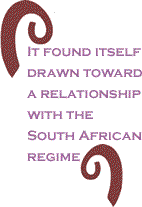[Sasha Polakow-Suransky,
The
Unspoken Alliance: Israel's Secret Relationship with Apartheid
South Africa (New
York: Pantheon Books, 2010). 324 pps. $18.45 hardcover]
(New
York: Pantheon Books, 2010). 324 pps. $18.45 hardcover]
I could hardly
contain my excitement after reading Sasha Polakow-Suransky�s
The Unspoken Alliance: Israel�s
Secret Relationship with Apartheid South Africa. So, I got on the phone and called
a long-time friend who had been active in the solidarity
movements against white colonial / minority rule in Africa
in the 1970s and 1980s. He responded: �Well, didn�t we already
know about the connection between apartheid South
Africa and Israel?�

What is striking
about The Unspoken Alliance is not that it
contains the revelation of a complete secret. My friend
was correct. Bits and pieces of this story had been public
for years, at least in some circles. What makes this book
different is both the level of detail and factual disclosure
combined with its blunt recognition of a strategic unity
between Israel
and apartheid South
Africa based on a common colonial /
settler framework.
Polakow-Suransky
provides historical background that may surprise many readers
in pointing out that the dominant political forces in Israel,
up through the late 1960s, saw themselves as operating within
an anti-colonial framework. Israel
reached out to many newly independent African states, for
example, providing a wide range of types of assistance.
While this �solidarity� may not have been driven completely
by the noble aims that Polakow-Suransky suggests, it is
nevertheless noteworthy. David Ben-Gurion and Golda Meir,
for instance, saw no inconsistency between advancing a settler
project in the Palestine Mandate (the territory occupied
by Britain until 1948) aimed at displacing the Palestinian
people, on the one hand, and positioning Israel as an ally
in the struggle for independence on the part of African
states. Interestingly, they suggested that they were an
outpost not only for the anti-colonial struggle, but also
one in the struggle against reactionary Arab regimes.
 This
paradigm began to change in the context of the June 1967
war between Israel
and the Arab coalition of Egypt,
Jordan
and Syria, and the subsequent occupation and colonization
of Palestinian territories. The situation shifted even further
in the aftermath of the Yom Kippur War of October 1973,
which Israel nearly lost. During
those moments Israel
made the decision to become a nuclear power and an essential
component of their ability to make such a decision was related
to the slow but steady construction of an alliance with
apartheid South
Africa. This
paradigm began to change in the context of the June 1967
war between Israel
and the Arab coalition of Egypt,
Jordan
and Syria, and the subsequent occupation and colonization
of Palestinian territories. The situation shifted even further
in the aftermath of the Yom Kippur War of October 1973,
which Israel nearly lost. During
those moments Israel
made the decision to become a nuclear power and an essential
component of their ability to make such a decision was related
to the slow but steady construction of an alliance with
apartheid South
Africa.
Apartheid South Africa, at the same time, was an increasingly
isolated state. Interestingly Israel, at least in the early 1960s, joined with
most of the rest of the international community, in condemning
the system of apartheid. Nevertheless, as Israel began to face international criticism for
its role in the 6 Day War and the subsequent occupations,
it found itself drawn toward a relationship with the South
African regime, a relationship that it entered into somewhat
ambivalently and later joined with determination and without
apology. One consequence of this developing relationship
was the steady decline, to the point of becoming obstructive,
of criticisms of the South African apartheid system.
The details of
this relationship read like an excellent politico-mystery
novel, yet they are documented. With the ascendancy of the
more reactionary elements of the Israeli establishment in
the 1970s (symbolized by the rise of Menachem Begin), the
paradigm of Israel as an anti-colonial outpost was completely
jettisoned in favor of Israel-as-fortress state. This new
paradigm was well-suited to justify the alliance with the
criminal South African regime.
Striking for any
reader will certainly be the discussion of potential cataclysms.
Once both Israel and apartheid South Africa achieved nuclear status, they were
prepared to entertain the actual use of such weapons. Polakow-Suransky,
in describing the circumstances of the Yom Kippur War, suggests
that the Israelis were prepared to use nuclear weapons against
the Egyptians and/or Syrians if the USA
did not intervene to provide additional military support
in order to blunt the Arab assault. Apartheid South
Africa, during the 1980s, contemplated
using nuclear weapons against those southern African states
that supported the national liberation forces of the African
National Congress and the Pan Africanist Congress of Azania.
This latter point helps the reader to better understand
the complicated politico-military situation in which the
national liberation forces in South Africa found themselves
in the late 1980s when negotiations toward the end of apartheid
commenced.

Interestingly Polakow-Suransky
ends his book suggesting that while - in his opinion - Israel is not yet an apartheid state, it is well
on the road. This was probably the greatest weakness of
the book, but a weakness that should not turn the reader
away from this work. Israel is already an apartheid state, both in the
context of the conditions of the occupation of the Palestinian
territories but also with respect to the treatment of Palestinian
citizens of Israel. Polakow-Suransky conceptualizes
apartheid far too narrowly rather than in the manner that
the United Nations defined it, i.e., a system of racist
oppression and separation. The South African system was
only one possible variation on a theme, not the only
apartheid model.
That said, what
this book succeeds in doing so well is dispelling the notion
of the supposed democratic and moralistic character of the
Israeli state. The alliance between Israel and South Africa, as well documented in this book,
was not a time-limited aberrant action on the part of an
otherwise honorable state. It was a cold, calculated maneuver
that not only was seen from the standpoint of naked self-interest,
but equally from within the context of a growing recognition
that two settler states needed mutual protection in a world
that was heightening its objections to such social systems.
At a moment of
increasing interest in the growth of the Boycott / Divestment
/ Sanctions movement in opposition to the Israeli occupation
of the Palestinian territories, The Unspoken Alliance
becomes that much more important to read.  The
struggle for Palestinian self-determination involves, among
other things, an ideological struggle against the dominant
Israeli narrative, a narrative that has suggested that a
people on the verge of extermination by the Nazis had the
right to seize a territory away from its indigenous population.
This narrative, in addition to holding a blind spot to the
indignity and injustice within which the Palestinian people
have been treated, first by the British colonialists and
then later by the Israelis, is premised on the notion of
the Israeli state as being grounded on a high moral platform
placing it beyond any criticism. The Unspoken Alliance
contributes to shattering at least one of the legs upholding
that platform. The
struggle for Palestinian self-determination involves, among
other things, an ideological struggle against the dominant
Israeli narrative, a narrative that has suggested that a
people on the verge of extermination by the Nazis had the
right to seize a territory away from its indigenous population.
This narrative, in addition to holding a blind spot to the
indignity and injustice within which the Palestinian people
have been treated, first by the British colonialists and
then later by the Israelis, is premised on the notion of
the Israeli state as being grounded on a high moral platform
placing it beyond any criticism. The Unspoken Alliance
contributes to shattering at least one of the legs upholding
that platform.
BlackCommentator.com
Editorial
Board member, Bill Fletcher, Jr., is a Senior Scholar with
the Institute
for Policy Studies,
the immediate past president of TransAfrica Forum and
co-author of, Solidarity Divided: The Crisis in Organized Labor and a New Path
toward Social Justice(University
of California Press), which examines the crisis of organized
labor in the USA. Click here
to contact Mr. Fletcher. |

